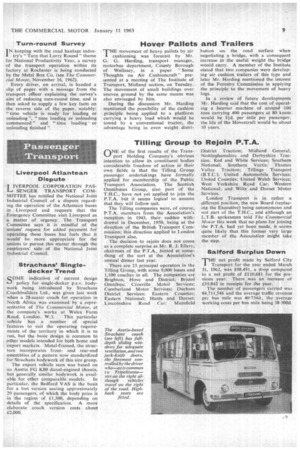Tilling Group to Rejoin P.T.A.
Page 11

If you've noticed an error in this article please click here to report it so we can fix it.
ONE of the first results of the Transport Holding Company's obvious intention to allow its constituent bodies considerable freedom of action in their own fields is that the Tilling Group passenger undertakings have formally applied for membership of the Public Transport Association. The Scottish Omnibuses Group, also part of the T.H.C., have not yet applied to join the P.T.A. but it seems logical to assume that they will follow suit.
The Tilling companies were, of course, P.T.A. members from the Association's inception in 1943, their sudden withdrawal in December, 1950, being at the direction of the British Transport Commission; this direction applied to London Transport also.
The decision to rejoin does not come as a complete surprise as Mr. R. J. Ellery, chairman of the P.T.A., hinted at something of the sort at the Association's annual dinner last year.
There are 23 principal operators in the Tilling Group, with some 9,000 buses and 1,100 coaches in all. The cotnpanies are Brighton, Hove and District; Bristol Omnibus; Crosville Motor Services; Cumberland Motor Services; Durham District Services; Eastern Counties; Eastern National; Hants and Dorset; Lincolnshire Road Car; Mansfield
District Traction; Midland General; Nottinghamshire and Derbyshire Traction; Red and White Services; Southern National; Southern Vectis; Thames Valley Traction; Tillings Transport (B.T.C.); United Automobile Services; United Counties; United Welsh Services; West Yorkshire Road Car; Western National; and Wilts and Dorset Motor Services.
London Transport is in rather a different position, the new Board (replacing the Executive) being autonomous and not part of the T.H.C., and although an L.T.B. spokesman told The Commercial Motor this week that no plans for joining the P.T.A. had yet been made, it seems quite likely that this former very large member of the Association might take the step.
Salford Surplus Down THE net profit made by Salford City
Transport for the year ended March 31, 1962, was 08,491, a drop compared to a net profit of £.110,681 for the previous year. There, was an increase of £39,842 in receipts for the year.
The number of passengers carried was 84,711,546 and the average traffic revenue per bus mile was 40.734d., the average working costs per bus mile being 38.300d.
















































































































